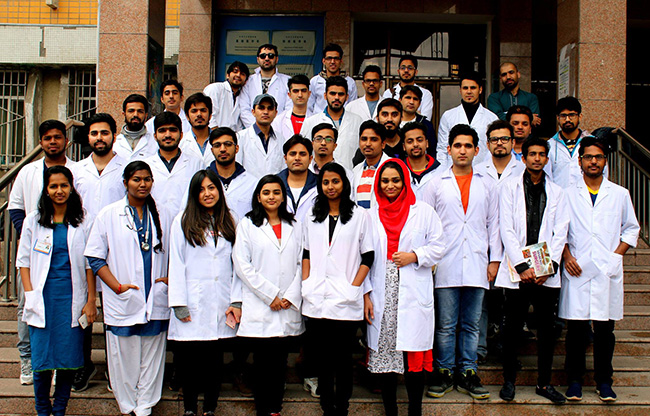
Studying medicine abroad has become increasingly popular, with China emerging as one of the top destinations for aspiring medical students. Its world-class universities, advanced medical facilities, and affordable fee structure make it an attractive choice for those seeking quality education in the field of medicine. In this article, we will explore the fee structure for MBBS in China (Bachelor of Medicine and Bachelor of Surgery) programs in China, along with other essential details to consider.
1. Understanding MBBS in China
MBBS stands for Bachelor of Medicine and Bachelor of Surgery, and it is a globally recognized medical degree. China has become a popular destination for international students seeking to pursue MBBS due to its high-quality education and state-of-the-art medical infrastructure.
2. Why Choose China for MBBS?
Studying MBBS in China offers several advantages. The country boasts some of the world’s best medical universities that provide modern facilities, expert faculty, and a comprehensive curriculum. Additionally, the cost of living in China is relatively lower compared to other countries, making it a cost-effective choice for many students.
3. Overview of Fee Structure for MBBS in China.
The fee structure of MBBS in China is competitive and varies among different universities. It typically includes tuition fees, accommodation fees, and other administrative charges. The Chinese government has made efforts to keep the cost reasonable for international students.
4. Tuition Fees in Top Chinese Medical Universities
Here’s a glimpse of the approximate annual tuition fee structure of MBBS in China programs in some of the top Chinese medical universities:
Renmin University Medical School
- First Year: $8,000 – $10,000
- Second to Sixth Year: $6,000 – $8,000 per year
Peking University Health Science Center
- Tuition: $9,000 – $12,000 per year
Fudan University Medical School
- Tuition: $7,000 – $10,000 per year
Shanghai Jiao Tong University School of Medicine
- Tuition: $6,000 – $8,000 per year
Zhejiang University School of Medicine
- Tuition: $7,500 – $9,500 per year
5. Additional Costs and Expenses
Fee structure for MBBS in China, international students may need to consider additional expenses such as accommodation, meals, health insurance, textbooks, and personal expenses. These costs can vary depending on the city and lifestyle.
6. Scholarships and Financial Aid
Many Chinese universities offer scholarships and financial aid programs to attract talented international students. Students with outstanding academic records may be eligible for merit-based scholarships, while others can explore various financial aid options to support their education.
7. Admission Process and Requirements
The admission process for MBBS programs in China generally involves submitting the required documents, including academic transcripts, letters of recommendation, and a statement of purpose. Each university may have specific admission requirements, so prospective students should carefully review the application guidelines.
8. Language Proficiency and Preparatory Courses
Most MBBS programs in China are taught in English, but it is beneficial for students to have a basic understanding of the Chinese language to interact with patients during practical training. Some universities may offer preparatory courses to help international students adapt to the language and culture.
9. Accreditation and Recognition of Chinese Medical Degrees
Chinese medical degrees are recognized by international medical bodies such as the World Health Organization (WHO) and the Medical Council of India (MCI). Graduates from accredited Chinese universities are eligible to take medical licensing examinations in their home countries.
10. Prospects and Opportunities After Graduation
Graduating from a reputable Chinese medical university opens up a world of opportunities for students. They can choose to pursue further specialization, return to their home country to practice, or explore job prospects in different parts of the world.
11. Challenges and Tips for International Students
Studying in a foreign country can be challenging, but it also offers valuable experiences and personal growth. International students may face cultural differences, language barriers, and homesickness. To overcome these challenges, staying open-minded, actively participating in campus life, and seeking support from fellow students can be beneficial.
12. Testimonials from MBBS Students in China
Testimonial 1 – “Studying MBBS in China has been a transformative journey. The professors are incredibly knowledgeable, and the practical exposure is unparalleled. I am confident that my decision to come here was the right one.” – Emily, 4th-year MBBS student
Testimonial 2 – “The fee structure for mbbs in China is reasonable, and the education standard is top-notch. I am grateful for the opportunities I’ve received here, and I am excited about my future in the medical field.” – David, 5th-year MBBS student
Admission Process and Requirements
To secure admission into MBBS programs in China, students need to submit the necessary documents, including academic transcripts, letters of recommendation, and a statement of purpose. Each university may have specific admission requirements, so it’s essential to carefully review the application guidelines and deadlines.
Prospects and Opportunities After Graduation
Graduating from a reputable Chinese medical university opens up a world of opportunities for students. They can choose to pursue further specialization, return to their home country to practice, or explore job prospects in different parts of the world. Chinese medical degrees are recognized by international medical bodies, making it easier for graduates to practice globally.
13. Frequently Asked Questions (FAQs)
Q1. Is the MBBS degree from China valid in other countries?
Yes, Chinese medical degrees are internationally recognized by major medical authorities.
Q2. Are there any scholarships for international students in Chinese medical universities?
Yes, many Chinese universities offer scholarships and financial aid to international students based on their academic performance.
Q3. Can international students work part-time while studying MBBS in China?
Yes, international students can work part-time on campus during their studies.
Q4. How much does accommodation cost for international students in China?
The cost of accommodation varies depending on the city and type of accommodation chosen by the student.
Q5. What are the career prospects after completing MBBS in China?
Graduates can pursue further studies, return to their home country to practice, or seek employment opportunities globally.
Conclusion.
Studying MBBS in China is a transformative journey that offers students an excellent education at a reasonable cost. With a diverse cultural experience and access to world-class medical facilities, it’s no wonder that more and more international students are choosing China as their preferred destination for medical studies. Aspiring medical students looking for an affordable and quality medical education should undoubtedly consider China as their gateway to a promising medical career.

